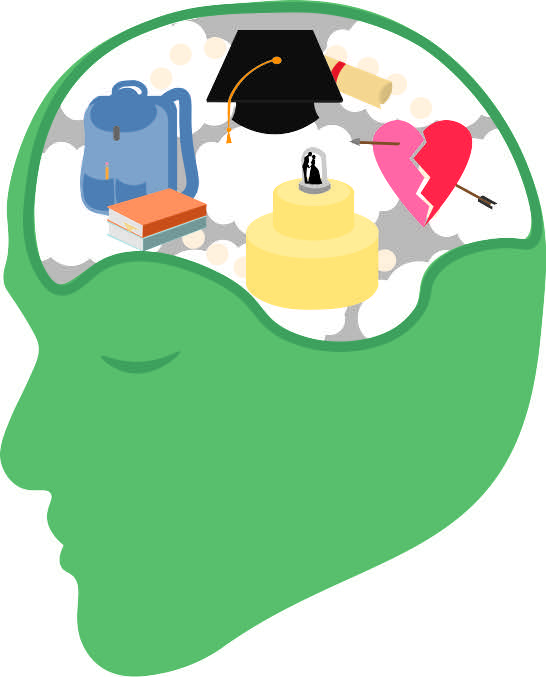 Illustration by Rachel HendrixKym Payne- Contributor
Illustration by Rachel HendrixKym Payne- Contributorkympayne@uab.edu
I vividly remember one thing about May 9 – my head was hurting. I was experiencing a traumatic life event that resulted in charges of assault and sodomy for my offender. I survived with 38 bruises, 7 knots on my head, and contusions down my back. Over the years that followed, my womanhood, security, and peace progressively faded. I failed to recognize my own resolve. Determined, I corrected my sick self. I understood that I was processing life through the filter of May 9. In other words, I was agreeing with my offender that I was weak, subservient and out of control. I chose to pave a new road that led to peace, authority, and happiness.
We possess the key to our own happiness. The key looks nothing like a winning lottery ticket, attractive partner, or perfect marks on your term paper. It does not look like the return of a loved one, or the approval of your folks. Technically, according to neurobiologist Patricia Goldman-Rakic, happiness looks like, “a complex schematic organized pattern of signals fired across the neurons and synapses of our frontal cortex,”. Ironically, this web is exactly what unhappiness looks like. In "The Neurobiology of Thought," covering the research of Goldman-Rakic, presents data illustrating that this complex pattern of signals can be redirected to a more desirable pattern. Old thought patterns will not be erased, but they do not have to be used. Happiness can be a conscious decision.
Many of us “lose our sanity,” if you will, due to minor incidences such as: road rage, a messy desk, or bad hair days. Then there are those of us who fall into depression or anxiety due to major life pains including: relationship betrayal, physical/sexual assault and death. Naturally, we create meaning from these experiences. Amherst College professor Peter Schilling describes this activity as, “neuropathways fill in missing information by using ideas that are already known to us.” The meaning we create reinforce what our environment has taught us, even if it is false or negatively impacting. Neuroscience tells us we can synthesize happiness instead.
For example, the classic college student may be overwhelmed with a heavy course/assignment load. College stress could make one resort to activities that release these burdens superficially. As opposed to happiness, these activities appear to equate to running after more suffering. Courage comes when one is able to accept the challenge. Strength comes when you care a heavy load. Courage and strength are friends of happiness and can be acquired by how we consciously choose to view experience.
To overcome negative effects of assault and sodomy I consciously assisted my brain in triggering positive neurotransmitters. I replaced insecure and fearful thoughts with positive attributes about my offender. I noted that the offender was victim to his own environment; when violence and aggression are one’s actions, it demonstrates it is what one is familiar with. Moreover, the assault in itself has prepared me to represent women in court. Women know I relate and I provide security and hope; therefore, I am grateful for the experience.
Master identifying all experiences as a potential asset and you will receive the benefits. Many facets of religion and spirituality would consider this the definition of a god or achieved awareness. Notable writer and cartoonist, Ashleigh Brilliant, says, “Due to circumstances beyond my control, I am master of my fate and captain of my soul.”


